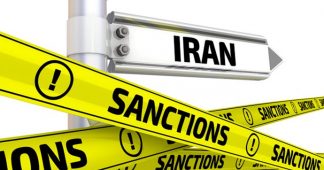
US Sanctions on Iran
The major industries in Iran, such as the automobile and steel industries, are expected to take a huge hit and there are also worries about the effect sanctions will have on the world’s economy and on the Middle East. In November, the U.S. plans to impose further sanctions on petroleum, the heart of Iran’s economy.
Despite the fact that, other than the U.S., Iran and the countries involved in the Iran nuclear deal are barely hanging onto it, it is clear that the goal of the U.S. is to cause the agreement to collapse as forcefully as possible. This is too aggressive. I urge the U.S. administration to reconsider.
Iran incurred economic sanctions from the U.S. and Europe when they detected Iran’s secret nuclear development. But in 2015, Iran agreed to restrict nuclear development in exchange for the cancellation of the sanctions.
Yet in May, the Trump administration pointed out that aspects of the agreement were defective, citing the time period that Iran had to restrain from nuclear development, and asserted those defects were reasons for the U.S. to withdraw from the deal. It can be said that the Trump administration imposed the sanctions before the U.S. midterm elections in November, strongly aware of the support from their domestic base. For Trump supporters, sanctions are also meaningful in that they negate the legacy of the Obama era.
However, the International Atomic Energy Agency has continued its oversight on Iran and its latest report shows that Iran has abided by the nuclear agreement. The claim by the U.S. is unfounded.
The Trump administration has said that it will not recognize exceptions in the oil embargo. This would have a big impact on Japan, which relies on Iran for 5.5 percent of its oil supplies, and the Japanese government is seeking an exception from the U.S.
Japan is currently supporting the Iran nuclear deal. However, it has not strongly criticized the Trump administration’s withdrawal from the agreement or the demands of the embargo. Our situation is that we must rely on the U.S. for resolving the North Korea nuclear missile problem. However, isn’t this a different issue from demanding that we not buy oil from Iran? Gasoline prices are already rising. Isn’t it true that many citizens will not agree with this?
Prime Minister Shinzo Abe should ask the U.S. to reconsider imposing sanctions. Trump called for an unconditional conference with Iran’s President Hasan Rouhani. It was aimed at invalidating the Iran nuclear deal. Doesn’t this further raise Iran’s distrust of the U.S.? It appears that China, the largest importer of Iranian oil, will increase yuan payments and not adopt the embargo measures. In the EU, European corporations are also invoking measures to invalidate the sanctions. It is unclear if the sanctions will proceed the way the U.S. expects. Japan needs to also deal calmly with this.
